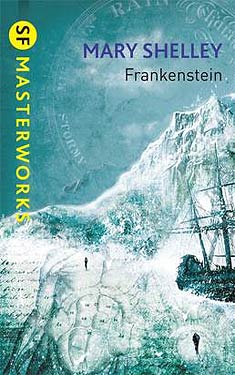Mary
Wollstonecraft Shelley
Completed
9/25/2013, Reviewed 9/26/2013
5
stars
Shortly
after beginning my personal challenge to read all the Best Novel Hugo winners,
I read a collection of essays by Isaac Asimov on SF. In many of the essays, he referred to “Frankenstein”
as the first SF novel. So when I began
the Women of Genre Fiction 2013 Challenge, I saw it as a wonderful excuse to
read “Frankenstein.” Initially, I was
nervous. In my youth, I never enjoyed
reading classic literature. I usually
found I couldn't stay focused on lengthy, rambling, descriptive prose. And besides, who talks like that? So I avoided classic lit for many, many
years. To my surprise, “Frankenstein” completely
changed my mind.
The
joy of “Frankenstein” is the prose. It is
a delight to read. Rather than fighting
the prose, I found myself wrapped in it like a warm blanket. Modern posers like Michael Chabon should take
a lesson from “Frankenstein” in how to use description in a more organic, less
pompous way.
The
copy I borrowed from the library contained essays and critical analysis of the
book. The analyses regularly reference
an original manuscript of the story that still exists, though not
complete. It shows that Mary Shelley’s
husband, Percy, edited the original text for her, making hundreds of changes to
her word choices. Apparently, her text
is rawer, more Anglo-Saxon. His changes
Latinized her language. I was
horrified. It was afraid that what I
loved was Percy’s editing rather than the Mary original work.
To
ease this cognitive dissonance, I had to step back, and realize that it shouldn't matter. I’m not on a scholarly quest. I had to take the book on face value and
allow myself to enjoy the pleasure I had in reading it. Percy-fied or not, Mary Shelley wrote an
amazing story and I can revel in it.
Another
technical note about the book is that I read the 1818 version. In 1931, a second edition was printed, with
Mary making drastic changes to the text.
Based on the analyses, I’m glad I chose the 1818 edition. (You’ll have to read some of these understand
all the differences). However, someday,
I’d like to read both the 1831 edition, and what remains of the original
manuscript and then re-read some of the analyses comparing the texts.
As
you will always hear, the book is nothing like any of the movie versions ever
made. The book is about fear, guilt, and
wretchedness. It is not hard SF; there is
no laboratory, no electricity, no hunchbacks.
The creature is borne of un-described chemistry. There is obsession and remorse. There is innocence and anathema. This is my type of SF. It’s about the relationships and fortunes of
the people as a result of the science.
One
of the most interesting essays in this edition noted how easy it is to overlay any
theme on the book: feminism, homophobia,
etc. I found myself reflecting on the
bullying and hatred I endured in middle and junior high school, and the
outright maliciousness of high school classmates. Like the monster, I perpetuated the bullying by
abusing others, rather than breaking the cycle of abuse. Unlike the monster, I did not consciously
choose to be abusive. But maybe that’s
part of the moral of this theme. Hate
begets hate; abuse begets abuse; something must die for transformation to
occur.
I
also found the theme of the nature of god rummaging around in my mind. Certainly, there are the comparisons to
Prometheus and Adam. But I considered
the nature of humanity, the fact that evil exists and we are condemned to live
with it. What did humans do to deserve
such evil? Catechism teaches us that it
is the Original Sin of Adam and Eve, that God really does love but we brought
this upon ourselves. So if God is
omniscient, why would it have created us if in its omniscience, it already knew
we would sin and have to suffer through life.
Is this love, or is it abuse? The
monster’s despair is the existential crisis resulting from this conflict. God is flawed, God has abandoned us, God
hates us, and ultimately, God is dead. The
monster receives no salvation, no relief from his wretched state, and is
condemned to die in despair. That is the
horror of this story.
Okay,
enough heaviness. “Frankenstein” is a great
read whether you see deeper meanings in it or not. The characters are amazing, the plot is tight,
and the twists, exciting. And despite
the wretchedness of the main characters and the horror it induces, I was moved
by its beauty whenever I sat down and opened the book. This
is a 5 star book.
If
you are interested in reading this edition with the essays and analyses, here’s
the info: “Frankenstein: the 1818 text, contexts, nineteenth-century responses,
modern criticism;” edited by J. Paul Hunter, New York: WW Norton, c.1996, a
Norton critical edition.

No comments:
Post a Comment